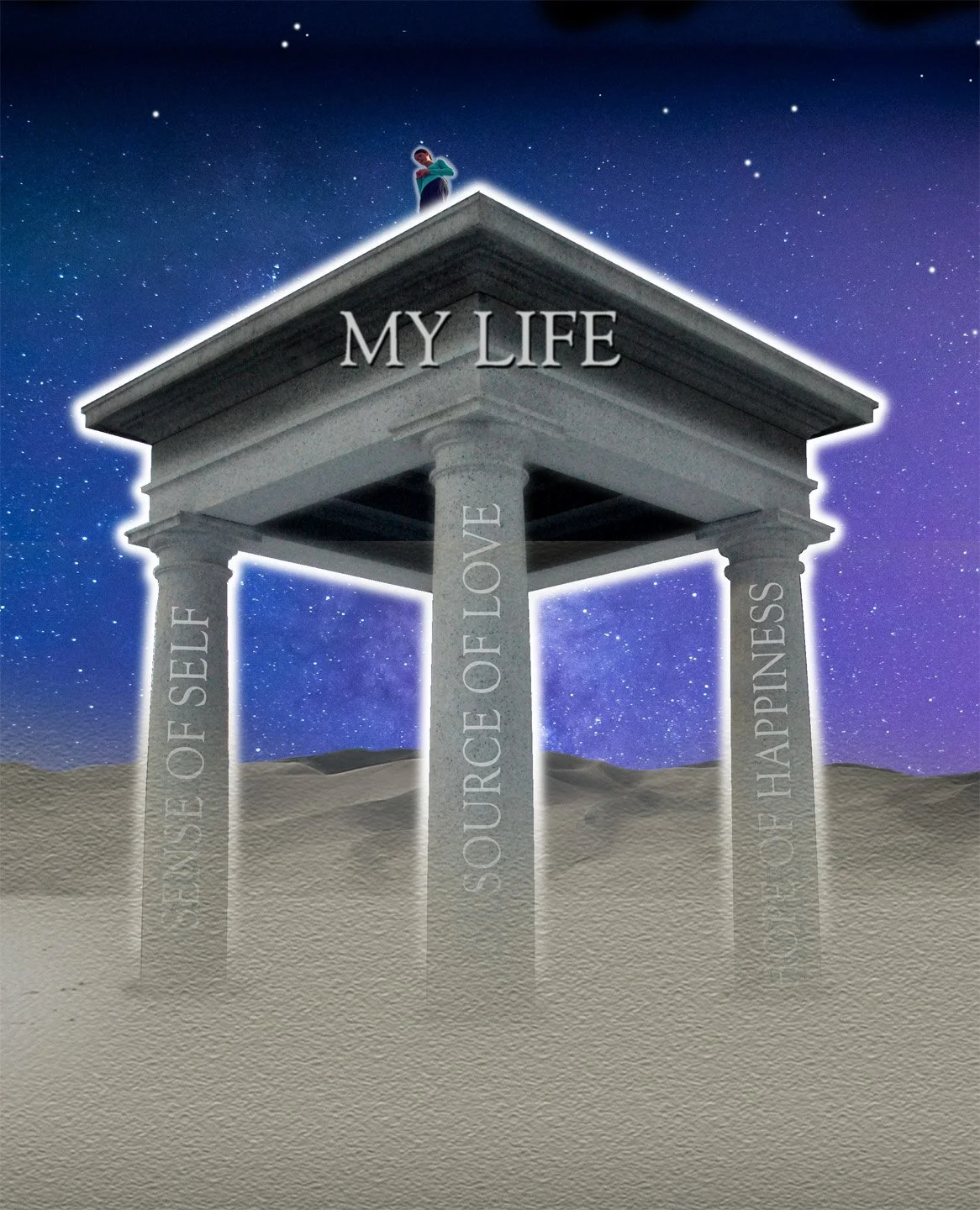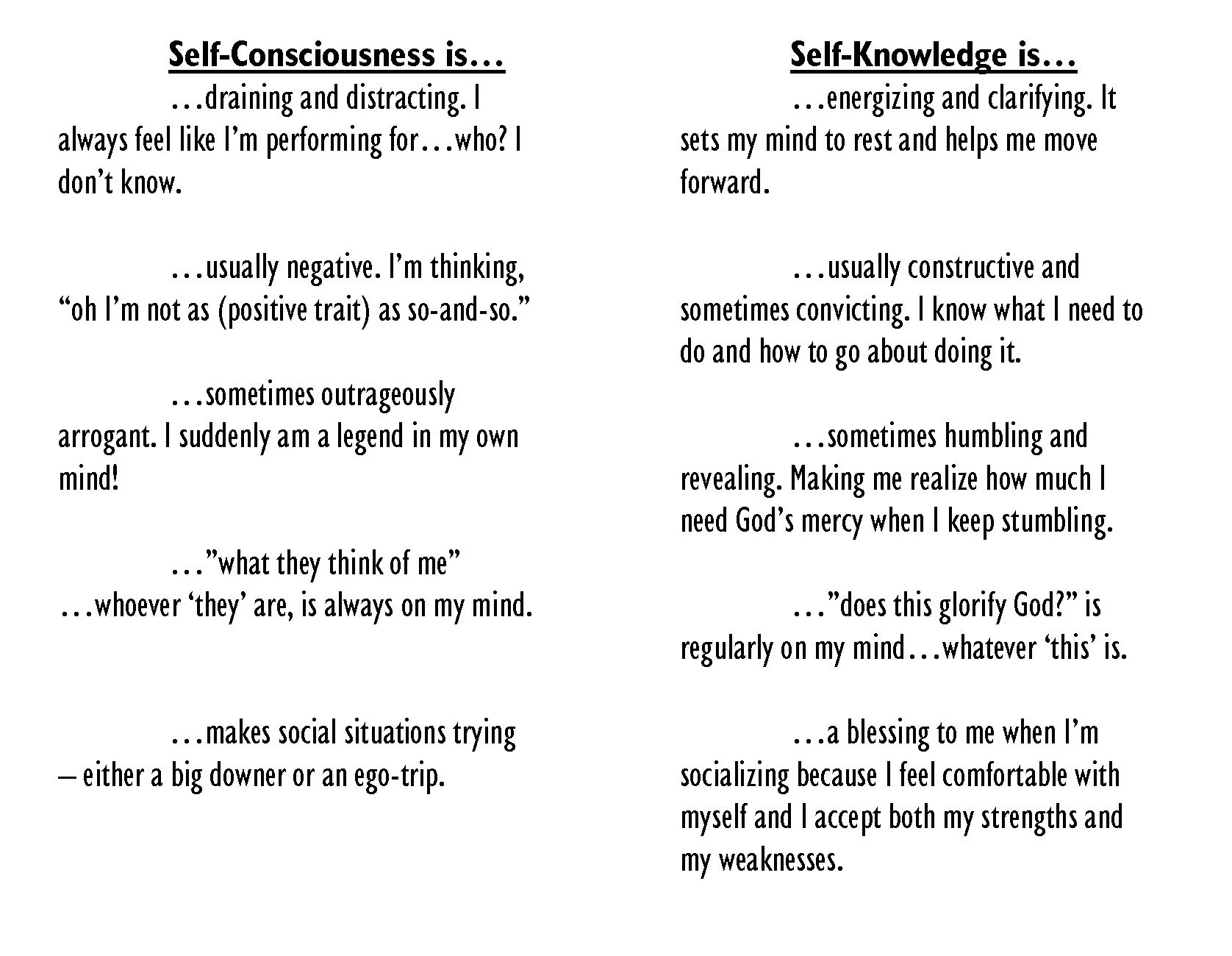Day 13. “Why do I…”
For I do not do the good I want, but I do the evil I do not want…. Miserable one that I am! Who will deliver me from this…?
St. Paul, Romans 7:19, 24
The journey of self-knowledge begins with this question: “Why do I...?” “Why do I act so foolish around people I want to impress?” “Why do I get so anxious about taking an exam that I can’t eat or sleep?” “Why do I compete for everything and against everyone in my life?” We can gain much understanding of who we are if we look hard at ourselves and try to understand the “why” behind our emotional reactions to the people and events in our lives. Notice the key phrase here: emotional reactions. They are clues to us in the search for self-knowledge. They give us an idea of where we place our confidence and find our security.
As an example, let’s take a look at this question: “Whom do I hate?” As Christians, we’re not supposed to hate anybody, right? “...forgive us our trespasses as we forgive those who trespass against us...” You may feel very confident that there is no one in your life right now whom you hate. Look deeper. Hatred does not always show itself in our lives by an active animosity or cruelty towards a person. It can be much more subtle. It can appear as a vague feeling of resentment or a continual annoyance with everything about a certain person’s behavior. It can be shown in a quickness to judge a person harshly: a resistance to acknowledging their positive traits, an unwillingness to forgive, or a refusal to give someone the benefit of the doubt. These are all examples of hatred in its early stages.
With this in mind, whom do you hate? Look for the people in your life towards whom you have a significant emotional reaction: a strong feeling of distaste, a sense of dread when they are present or a heavy sadness. Wouldn’t you like to know why you react this way to these people? You can.
We return to the Level of Awareness -- the surface on which you find all that is in your daily life. Walk over to one corner and look over the side. There you see a massive stone pillar that extends downward from beneath the platform and disappears into the brooding gloom of the sandstorm far below. Go now to another corner and do the same. You find another pillar. At the third corner there is still another. Now go to the fourth. As you peer over the edge you are struck by the surprising discovery: there is no fourth leg! No wonder this platform on which you stand is so shaky. It’s only standing on three pillars. Tripods are notoriously unstable. This structure is no exception.
These stone pillars represent the three primary supports on which your whole life rests. If they are stable, you are stable and your life is peaceful. If any one of them is upset, or even threatened, you experience a reaction. An emotional reaction. Your soul will send you a message. “Warning! Danger!” If you have never really thought about it, you will find this to be true. If these pillars shake, our whole life becomes unstable. We learn much from our reaction in times that are “shaky”. We also learn much from what we grab hold of for stability.
The three pillars have names. The first pillar is called, “Sense of Self”. This pillar is your identity and where you place your worth. The second pillar is “Source of Love”. It rests on the primary love relationship or relationships you rely on in your life. The third pillar is your “Hope of Happiness.” It has both a short term and a long term dimension. In the long term, it is resting on your dreams. Everything you look forward to in your future to make you happy. In the short term, it is grounded in your immediate expectations about the way things should be. The two are closely related. Many of our short term expectations are based on our long term aspirations. We all have them. We’ll learn more about them soon.
The first goal of our journey of self-knowledge is to solve this riddle: If I can’t see the ground where my three pillars rest, how can I know what they’re resting on? How can I know where I ground my Sense of Self? Who is my primary Source of Love? What is the dream that is my Hope of Happiness? We can take some initial guesses as long as we understand that they are only guesses. To find out the truth, we’ll have to investigate our emotional reactions more closely.
Novena Prayer
Jesus says: “Blessed are the poor in spirit for theirs is the kingdom of heaven.”
Pier Giorgio responds: The faith given to me in Baptism surely suggests to me that of yourself you will do nothing; but if you have God as the center of all your actions, then you will reach the goal.
Let us Pray: Blessed Pier Giorgio, teach me true poverty of spirit. Help me understand that God cares for me; and that He asks me, in return, to care for others, especially those in need. Guide me to make choices in my life which will show a preference for service of God and neighbor, rather than accumulating financial wealth and social advantage for myself. Give me a special love for the poor and the sick.
Blessed Pier Giorgio, I ask for your intercession in obtaining from God, Who is the Lover of the poor, all the grace necessary for my spiritual and temporal welfare. I confidently turn to you for help in my present need: (in your own words, ask for the Lord to grant peace, clarity and loving guidance in your discernment journey)
A Book of Prayers in honor of Blessed Pier Giorgio Frassati by Rev. Timothy E. Deeter
Make it My Own
Daily Discernment Workbook
EXAMINE MY HEART
1. Who Am I?
I now take an initial try at identifying my Sense of Self. I write “Sense of Self” at the top of a page in my journal and begin to write down the abilities, attributes, relationships where I place my identity, my feelings of worth. I’ll start off with the phrase: “I am...” and go from there. Initially, the list will be fairly obvious. Things like:
I am an athlete (what sport?) _
I am a student
I am a daughter/son
I am good with computers
I am a hard worker
I am a musician/singer/artist/dancer (what kind?)
GOING DEEP
2. Where I Place My Worth
Now, I go deeper. Remember, we’re talking about where I place my worth as a person. Often we define our worth in contrast to other people’s perceived weaknesses. With this in mind, I think about the attributes I really pride myself on. Here are a few suggestions to get started:
I am the info-source for all the dating relationships among my friends; I’m always the first to know who’s going out with whom.
I am the cleverest; I always get in the last word.
I am the “humbler”. When I perceive that someone is puffed up, I will cut them down to size.
I am the funniest; I always tell the best jokes, or the dirtiest jokes. I get the most laughs.
I am the most attractive; I get the most attention at the party.
I am the pleaser; I try to make everyone happy.
I am a winner; in my sport (or in any other competition), I never lose.
I am the “can-do” person. Give me a practical problem and I can find a practical way to fix it.
I am the achiever. Everything I set my mind to doing I accomplish it to perfection.
I am the “Church expert” – anything anybody wants to know about the Church, ask me. I have the answers.
I am the “spiritual” guy/girl. I always pray longer after Mass than anyone else.
I am always right. I never lose a debate or a disagreement. (C’mon, be honest)
I am the sensible one. When everyone else is losing their heads, I stay calm.
I am in charge. No one else can call the shots as well as I do.
I am the rock. Everyone turns to me with their problems.
I am self-reliant. I depend on myself and no one else. I trust myself and no one else.
I am the victim. Everyone is so inconsiderate of me. My feelings are always hurt.
I am the “drama-magnet.” I move from crisis to crisis in my life.
Note: This list is not for the purpose of diagnosing other people’s Sense of Self. My focus is on me. I’ll avoid analyzing my family and friends.
3. I Am Who I Know
Some of my Sense of Self will come from relationships. These could be things like:
I am the boyfriend/girlfriend of .... (Yes, you’re not dating during discernment time. Still, it’s possible to place your sense of self in past or “hoped for” future relationships)
I am always the teacher’s favorite student.
I am the nice person. I want everybody to like me.
I am the good son/daughter.
What relationships most define me?
Once I’ve made a substantial list, I’ll try to identify the top three items on which I base my “Sense of Self” labeling them 1, 2 and 3. Then I’ll print out the “Soil Sampling” document and write these top three, along with any others I feel are most significant, in the first column. I’ll hold on to this sheet and keep it with my journal, since I’ll be using it for the next few days.
MY FAITH BUILDERS
4. Self-Knowledge vs. Self-Consciousness: What’s the Difference?
Self-knowledge is good, but it’s often confused with self-consciousness. Self-consciousness is a form of pride and it is very hard to get rid of.
Can you tell the difference? Below are distinctions between self-consciousness and Godly, authentic self-knowledge. Which ones are most familiar to my experience of daily life? Circle them.
Help! I’m totally self-conscious. What to do?
How do I overcome self-consciousness?
Try these daily disciplines.
Turn my pride into praise. When I think about my awesome awesomeness, I turn to God in thanksgiving for the gifts he has given me AND for loving me despite my self-centered pride.
Smile because God loves me anyway. I laugh at myself, not in mockery, but in amusement – I say to God, “See what you’ve got to work with?”
Better reflection. When I look at myself too long in the mirror, I spend an equal amount of extra time in prayer.
Live in the light. When I’m self-condemning because “I’m not as good as…” I acknowledge that I’m in a negative frame of mind and ask a close friend to pray for me. Overcoming the shame and embarrassment of asking for help is a way of practicing humility.
Which of these do I feel God calling me to commit to doing? (can be more than one)
Conclude with
“Glory be to the Father,
and to the Son,
and to the Holy Spirit.
As it was in the beginning,
is now, and ever shall be.
World without end, Amen.”




